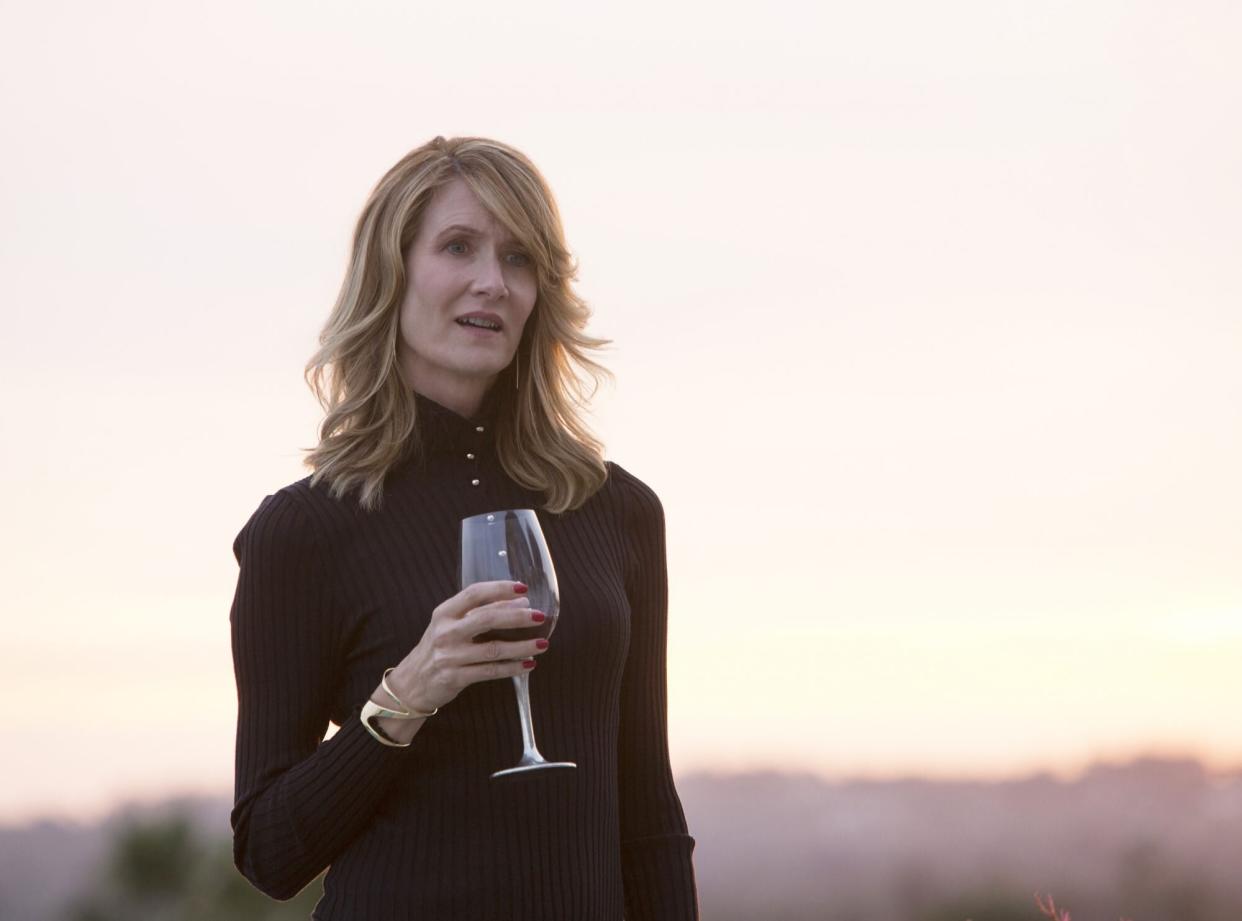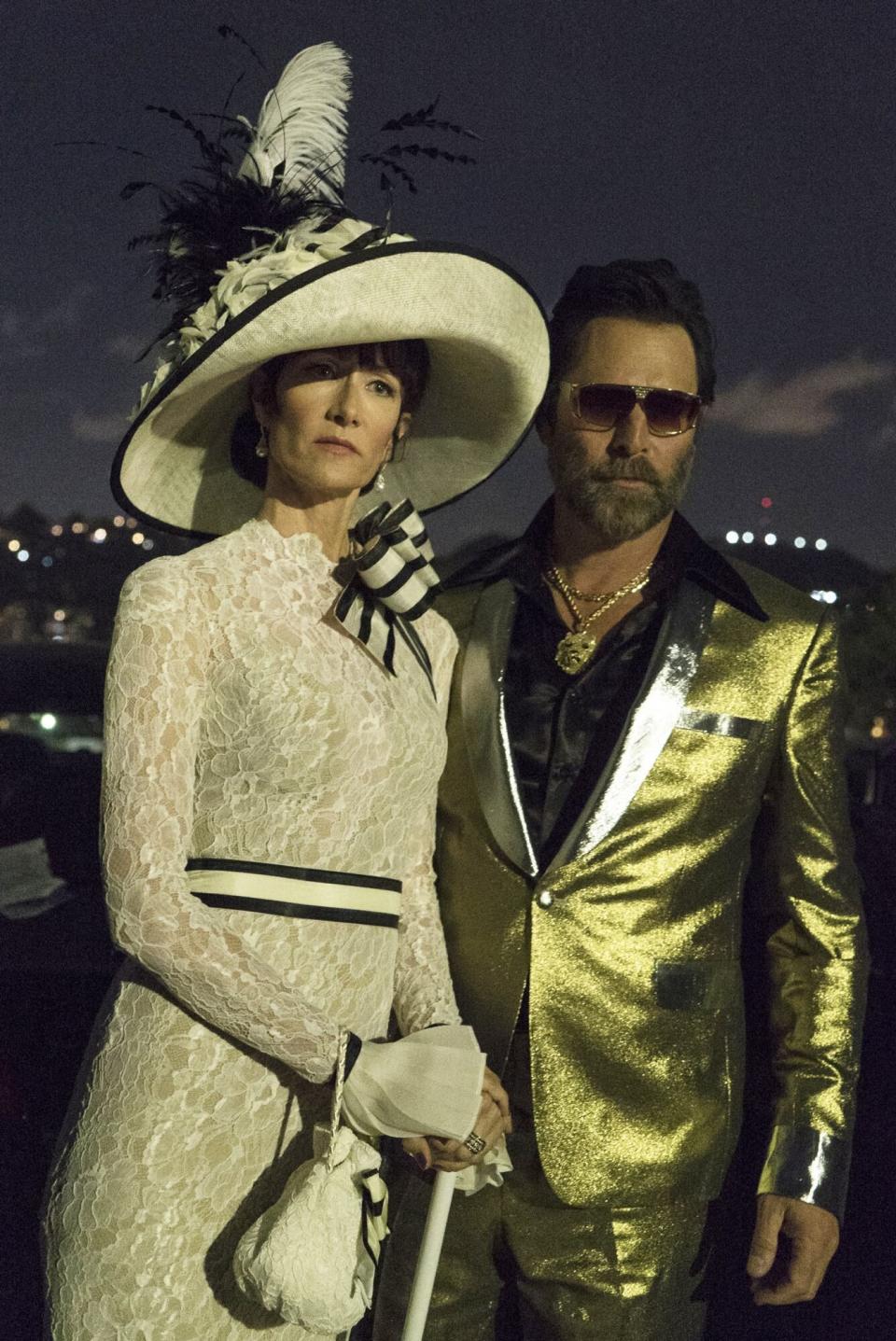Like You, Laura Dern Is Also Hoping for Another Season of Big Little Lies

- Oops!Something went wrong.Please try again later.
- Oops!Something went wrong.Please try again later.
- Oops!Something went wrong.Please try again later.
- Oops!Something went wrong.Please try again later.
Hilary Bronwyn Gayle/Courtesy of HBO
Of all the power moms on HBO's Big Little Lies, none was more ballsy than Laura Dern's Renata Klein. Throughout the show's seven episodes, Renata served as a phone-throwing foil to the carpool-lane moms of Monterey, CA. Being vilified for her success was something the character continuously came back to during the show: "I'm a working mom," she said during Sunday's finale. "Worse, a CEO, which deems me a bitch."
While Renata had a fair number of enemies in the fictional world of Big Little Lies, her mafia-style threats, gif-able freak-outs, and chic sweaters were winning over viewers. "What I really appreciated about Renata was that people really went along for the ride. In the first few weeks, they'd come up to me and say, 'Oh, my god, what a bitch. She's so fun to hate,'" Dern told InStyle. "And so that was delicious fun; it really was an amazing part of the ride, for sure."
We spoke to Dern–serendipitiously on Equal Pay Day–about her advice for working moms, her character's disturbing parallels to Hillary Clinton, and what she hopes happens next for Big Little Lies.
Reese Witherspoon said that she originally thought she would play Renata. Were you initially going for another role?
She was obsessed. We had been asked what part we would play and both of us said we would be playing each other's part. I know she's obsessed with Renata. Nicole [Kidman] really liked Renata, too. She's just so fun, you know? And also it was fascinating to me to be shooting this show while the election was going on because, regardless of anybody's politics at the time, there was a very polarizing theme that was occurring about man versus woman in the presidential election.
And people that I respect immensely—again, regardless of their politics—I would hear them make disturbing statements about who they think Hillary Clinton is based on the fact that she's brilliant or a politician. Things like "liar," "cutthroat," "not a good wife," "must not be maternal," those kinds of things. We don't know anything about who she is in that way. And so that was what was so frightening because nobody was talking about the kind of dad Donald Trump was. Or the kind of partner he is to his wife. It's pretty interesting that when it comes to women in power there's immense focus on this idea of what we're supposed to be, which are wives and mothers. Yes, we've entered the workplace and we've entered the boardroom, but there's still a lot of sexism by even us women toward other women about juggling it all. And so I realized how much fun I was gonna have with sort of helping myself consider how much of that there is, how much I've done to myself and to other women. And so I felt really privileged to play out that storyline.
VIDEO: The Glamorous Looks from the "Big Little Lies" Premiere
There was quite a lot of Internet chatter about male critics reducing the show to a guilty pleasure or a "compendium of cliches." How frustrating is that for you?
I don't try to focus too much on it because all you can do is sort of create what you feel is true. I remember when we did Enlightened for HBO, it was a fairly new show, and almost immediately there was a lot of like, "Oh, great. Another batshit crazy female." And that was the whole point of the show we were trying to make. I feel like it's the same with Big Little Lies. It's like: "Oh, guilty pleasure. Watch a bunch of privileged women deal with their lives. And, oh, there's a murder." But what is it truly all coming from? Now we know it is all surrounding the question of treatment toward women. How women treat each other. How a man treats a woman. How when people treat each other kindly they can come together to protect each other. I love whenever something on the surface seems deliciously easy and then you start digging deeper and it has a lot to take from it. And we get to take whatever we want. So I never let that bother me too much.
After playing this role, do you have any advice for career-oriented moms who also feel they've been labeled unfairly?
Well, I hope that all of us women can be on each other's side and be each other's greatest, fiercest champions. To question, judge, or especially tear down another woman for her success in this world is just nutty. It's shooting ourselves in the foot. Why would any woman do that? As Meryl Streep spoke about beautifully at the Democratic Convention, we are standing on the shoulders of the women who've come before us. And many of those women are the Renatas.

Hilary Bronwyn Gayle/Courtesy of HBO
Let's talk about the finale. The fight scene was legitimately violent. Nicole's role was very physically demanding. She said she had actual bruises on her from filming. Did you ever get hurt filming this show?
Honestly, we all got a little thrown around and beat up, to say the least, for that final sequence. It's done in this very artful way to try to show you everything, but we're talking about nights of filming for just the attack sequence. It would be hours and hours of just Alex [Skarsgard] and myself, and then just he and Reese, and then just he and Shailene [Woodley] got very physical. He being very careful and some people there, but the bottom line is you had to feel the violence of it. We were at the top of stairs on concrete with no real ability to make it as comfortable as one might like. So it was dramatic and fantastic. But what was particularly amazing about it, was on that night, we were looking out for each other. It really showed the amazing thing about working with women.
Reese, Nicole, and I all started as kids. And you were the one girl on the set. Maybe there are two actresses in the movie. Certainly, when we all started there was rarely, if ever, a crewmember that was female. My makeup people were men at the beginning of my career. So it's been such a shift in terms of–hopefully, on this day we can say not only equal pay for the same work, but women showing up in jobs that they're brilliantly skilled for, and storytelling about women and female characters, which we know is incredibly rare.
Did you all watch the finale together?
Reese and I did because we were, luckily for us, on this trip. So we got to watch it together with a group of people who hadn't seen it. A couple friends were like, "We will kill you if we're talking in earshot and we haven't seen it and we don't know what happens and you spill this." So it was really friends who needed to know how it ends and were so scared we were gonna ruin it for them that encouraged it.
Were you watching them watch the show, or were you also transfixed by the episode?
I was locked in. I think she was too. I forgot being a participant at all. I think it's really powerfully made.
The biggest question on the table is what will happen next. Jean-Marc Vallee said there shouldn't be a second season. Do you agree?
Honestly, I've fallen in love with this character, so I can never agree to not wanting to explore these women together again. That would just be the most delicious fun because we love each other and we love these roles. So it's impossible to answer that as the actor. I think the real question now lies in the hands of the novelist and the writer who adapted it to go, "What would it be? Where would it go?" And if they feel inspired and excited, I would think it would inspire and excite everybody else. But when it doesn't exist yet, I think it's too elusive for Jean-Marc or anybody to sort of answer that. I think everybody's sort of remaining open; it's hard when we love something to not hope for more, for sure.
This interview has been edited and condensed.

